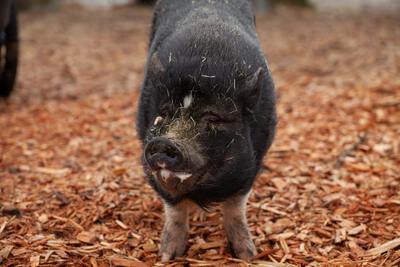
Chinese Herbal Vegetables
Eating according to the seasons
According to Chinese herbal medicine, the body is like a tree that lives through the seasons of nature, and it needs constant replenishment to stay healthy and prevent illness. In the spring, the leaves bloom; in the summer, the leaves and fruits ripen; in the fall, the leaves wither; and in the winter, the leaves fall. There are five bodily organs that need to be replenished with each season.
The Liver
The liver, which enriches the blood with energy and cleanses the body of toxicants, is replenished in the spring time. Eat beet leaves, daikon leaves, leeks, and shiso.
The Heart
The heart, which seeks comfort and coolness from the heat, is replenished in the summer. Melons, squash, cucumbers, tomatoes, bitter melon, sponge gourds, and many fresh high-water content vegetables have a cooling effect and should be eaten.
The Lungs
The lungs, which suffer from colds, coughs, and sore throats in the dry fall season, need to be replenished with foods such as spinach, lotus seeds and roots, lily bulbs.
The Kidneys
The kidneys, which are the lowest organs in the body like the roots of a tree, need protection to survive the winter. Replenish the kidneys with vegetables like broccoli, green chard, mustard green, tong ho, and dark leafy greens.
The Stomach
The stomach, which is located at the center of the body, is crucial to health because it digests food that is used for the other organs. Replenish the stomach with foods like sweet potato leaves, Chinese yams, tong ho leaves, and aloe vera.
Importance of Sea Vegetables
Also, the Chinese and Far Eastern civilizations have recognized the importance of sea vegetables in the diet for thousands of years. They consume sea vegetables frequently all throughout the seasons. Sea vegetables are high in proteins, vitamins, and minerals, and have traditionally been eaten to strengthen the blood, heart, and circulatory system. Compared with dairy foods, sea vegetables provide up to ten times more calcium and iron by weights and contain other important trace minerals. Varieties range from kelp, arame, hijiki, kombu, wakame, to toasted nori sheets from which sushi rolls are wrapped.
Recommended Reading:
Disclaimer: The views expressed in articles published on HappyCow are those of the authors alone. They do not represent the views or opinions of HappyCow nor its staff.
Some links in this article are possibly part of Amazon's affiliate program, so when you make a purchase a small amount will go to support the HappyCow website.
This information is not intended to replace the diagnosis, treatment and services of a physician. Any recommendations and indications are at the user's discretion. For severe or life-threatening conditions, always seek immediate medical attention. While we work to ensure that product information is correct, and list only products containing vegetarian ingredients, on occasion manufacturers may alter their ingredient lists. Actual product packaging and materials may contain more and/or different information than that shown on our Web site. We recommend that you do not solely rely on the information presented and that you always read labels, warnings, and directions before using or consuming a product. For additional information about a product, please contact the manufacturer. HappyCow assumes no liability for inaccuracies or misstatements about products.






